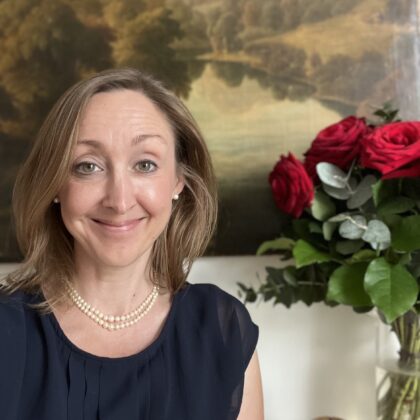Nominees announced for Art Therapists Awards 2024
Announcement
This year we launched two brand new awards to celebrate and recognise the inspiring work that is being undertaken by art therapists across the UK. The awards will be awarded at our annual conference next month. Our Chair, Claire Louise Vaculik, tells us more.

In Spring 2023, we received a proposal from two of our long-serving and distinguished members – our Honorary President, Prof. Diane Waller, and Dr Susan Carr. They suggested that the British Association of Art Therapists develop ways to recognise and celebrate some of the many art therapists who have made such outstanding contributions to the profession. This could be through a long and significant career, through developing innovative and ground-breaking clinical practice or research, through leadership of the profession, or a major contribution to the professional body. The proposal was put to everyone our annual general meeting (AGM) that year, and members voted to support this.
The awards
Since then, we have developed three new awards: a Lifetime Achievement Award, with nominations coming from elected Council members; and two awards for which nominations are received from across the art therapy community – one for Innovation and another for Inclusive and Anti-Oppressive Practice. Together, these three annual awards all aim to really recognise and celebrate the work that is being undertaken by art therapists and the teams they work in across England, Scotland, Northern Ireland and Wales. We also hope that you will be inspired and encouraged in your own work too!
We were delighted to see so many nominations come in earlier this year. These were then each carefully considered by a panel, made up of some of our elected Council members and our Honorary President, who were joined by Professor Carolyn McDonald, Chief Allied Health Professions Officer for Scotland, and Daniel Regan, our Equality, Diversity and Inclusion Advisor.
Three art therapists have now been shortlisted for each of the prizes, with the final award scheduled to be announced at our annual conference this November.
Inspiring practice from across the UK
You can read more about the categories and some of the amazing work being done by these art therapists, from all across the UK, which has inspired colleagues to nominate them for one of these awards:
Inclusive and anti-oppressive practice award
For this award, inclusion and anti-oppressive practice are seen as an intentional approach that values diversity, promotes equity, and actively works towards dismantling systemic barriers to wellbeing. This award recognises an individual or team of art therapists who have made significant contributions to improving the inclusive nature of service delivery, the development anti-oppressive practices, or provided art therapy to communities that may not have traditionally accessed art therapy.
Corrina Eastwood
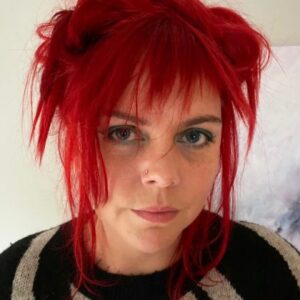
Corrina Eastwood was nominated for the breadth of her creative and inspiring contribution to the art therapy profession through the on-going promotion of inclusive practice, highlighting of structural discrimination, teaching, writing, and radical social activism.
Corrina’s nomination noted she has been at the forefront of reflection on inclusivity in our profession, including questioning the structures by which we organise our shared work. Her contribution is characterised by the rigour and depth of her thinking; by her passion and creativity; and by her bravery and willingness to say things that need to be heard.
Corrina has always valued diversity, promoted equity, and actively worked towards dismantling systemic barriers. Supporting people from many different marginalised groups, she has worked to give voice to their perspectives and experience in the therapy room and beyond, also by writing about practice.
Founding an intersectional feminist art therapy charity and co-founding an arts organisation that gives voice to marginalised groups, Corrina has held a role as a social activist too; her own art practice was seen as inspiring and fundamental to her work. Teaching and work with organisations around equality, diversity and inclusion support, Corrina has encouraged change across the art therapy profession too – writing the article that inspired the International Journal of Art Therapy’s Actions for Change, being a guest editor of the special issue on intersectionality, and providing consultancy for the British Association of Art Therapist’s equality, diversity and inclusion policy.
Corrina’s work has supported art therapists to deepen their understanding of theories relating to inclusion and diversity and to reflect on their own experience, encouraging people from under-represented communities to consider art therapy as a profession. She has also provided vital support for those training, who might not have been able to see themselves, their voices, or their cultural practices and beliefs represented as widely across the art therapy profession yet.
More recently, Corrina co-edited a book on intersectionality in the arts psychotherapies (with Jessica Collier), which has had a significant impact on the arts therapies and psychological professions.
While many art therapists are committed to inclusive practice and speak out to support service users, the nomination explained that what distinguishes Corrina’s contribution is the breadth of her activism, her commitment to this work, her willingness to speak out, and her understanding of the need to work strategically as a whole profession – dismantling the structural racism that we have inherited, questioning ourselves, and our practice.
Nicki Power
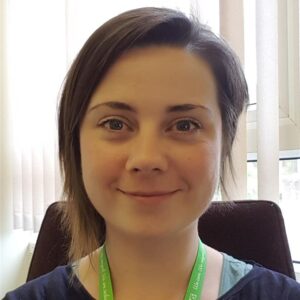
Nicki Power was nominated because she works in a way that makes research more collaborative and more inclusive, giving an active voice to people with learning disabilities, and empowering and inspiring professionals through her practice, films or publications.
Nicki’s nomination explained that she works in a way that makes research more collaborative and inclusive. She achieves this by using co-production with people with learning disabilities (PWLD), engaging multiple stakeholders (across traditional organisational or clinical boundaries) as a core part of her research, and employing creative methods of inquiry and storytelling to facilitate conversations about complex experiences or challenges.
Nicki is currently undertaking a PhD, exploring what happens in art therapy and how the combination of art and talking helps people with learning disabilities, drawing directly from their views and the views of those who support them. Her writing and work as lead author on the first international systematic review of art therapy with PWLD were shared, along with a new book on Art Therapy with PWLD (co-authored with Simon Hackett), which brings together practice from across the world.
Nicki’s willingness to share her learning and expertise has been of great benefit to anyone who has had the pleasure of working alongside her. A recent project was particularly highlighted, for which Nicki has worked closely with the Lawnmowers Independent Theatre Company – a charity run by and for people with a learning disability. Nicki’s approach has furthered understanding of co-production and inclusion, so other professionals can identify the tools, resources and the time it takes to carry out true authentic inclusive practice. Her work helped the charity secure sustainable funding, allowing them to avoid reliance on charity funds and donations to survive.
The depth and commitment that Nicki has to inclusive practice inspired her nomination as a key example of anti-oppressive practice that should be recognised throughout the profession, because her work recognises and mitigates against power imbalances in co-creation, sensitively empowers conversations that recognise the impact of people’s experience of marginalisation and discrimination, which enables self-advocacy and activism. The impact of this was evidenced by a heartfelt poem, written by the group from the Lawnmowers Theatre Company, which ended: “So Nicky we love you with all our hearts you’ve gave us opportunities to help your craft to make your work as accessible as can be we all just want to truly thank thee.”
Professor Susan Hogan
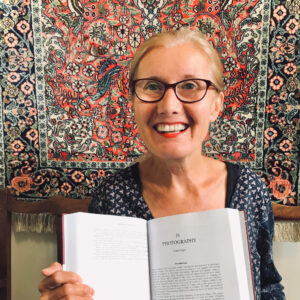
Professor Susan Hogan was nominated for her distinctive contribution to the field of arts in health in relation to gender, through writing, films, innovative application of art therapy techniques to social-science methods, and anti-oppressive critiques of reductive interpretation in art therapy and the arts in psychiatry.
Susan’s nomination explained that it was her distinctive contribution to the field of arts and health in relation to gender that inspired colleagues. This included a significant body of work – a number of books that address gender and women’s issues in art therapy, and the first book on feminist approaches, which also contained the first essay to examine internalised racism in British art therapy practice.
Leading the way in investigating the topic in the arts-and-health literature, she had set out a rationale for why cognisance of representations of gender is an important topic for mental health practitioners and art psychotherapists practice. The nomination noted that Susan had edited the first book in the art therapy literature on gender issues, which also touched upon intersex and queer identities, and especially lesbian identities.
After this, she went on to edit a series of books that deeply theorise gender in the arts and health. Furthermore, she produced the first book to explore the use of the arts and health in pregnancy, birth and new parenthood, in addition to writing many peer-reviewed journal articles.
The suite of films Susan has made exploring issues surrounding pregnancy and childbirth were also shared, including reflections on why these were so important for art therapy – her approach is anti-oppressive in its emphasis on iatrogenic practices.
The nomination also noted that Susan is well known for her anti-oppressive critiques of reductive interpretation in the fields of art therapy and arts in psychiatry. It highlighted her contributions to applying art therapy techniques to social science methods, which resulted in several publications where she combined her interest in gender and inequality with methodological innovation. The use of art therapy techniques within the field of social science visual methods was shared as an example of her innovative and creative contributions.
Finally, the nomination provided details of another film that charted the progress of a group of women learning to make contemporary art, exploring their birth experiences and the transition to motherhood. This film was shortlisted for the Arts and Humanities Research Council’s Research in Film Awards.
Innovation award
For this award, innovation is seen as the creative and strategic integration of new ideas, methods, and approaches to enhance the effectiveness and scope of therapeutic practice. It goes beyond traditional techniques, incorporating novel concepts, tools, or technologies to address the evolving needs of clients and the broader context of the settings.
This award will celebrate an individual or team of art therapists who have developed innovative clinical practice, research, or delivered art therapy in a way that has had a profound impact.
Dr Caryl Sibbett
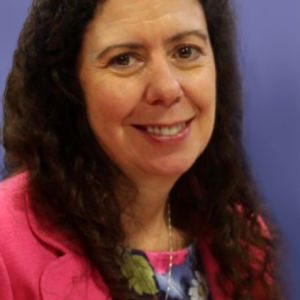
Dr Caryl Sibbett was nominated because of her recognition of the importance and necessity of ongoing innovative exploration of theoretical concepts, job creation and training, which has benefitted learning, research, jobs, and service users and supported the art therapy profession in Northern Ireland and more widely over many decades.
Caryl’s nomination highlighted her recognition of the necessity of ongoing innovative exploration of theoretical concepts, job creation and training. Also, her consistent application to furthering ethical practice in the field of art therapy/art psychotherapy over three decades. This included establishing the first HCPC-approved art therapy training in Northern Ireland, for which Caryl went above and beyond her role. As a result, art therapy provision now exists within a wide range of services for children, young people and adults. She won awards for her work and developed the training further, as a trauma-informed pluralistic course validated in other universities.
Caryl helped to develop paid employment opportunities in cancer care settings and schools from the voluntary work she had undertaken there. She was the first coordinator of Region 20 (BAAT-NI), setting this up because of her recognition of the need for ongoing continued professional development (CPD) and a professional forum locally.
Caryl has written extensively, from her PhD, to book chapters, articles, and papers presented nationally and internationally. Caryl served as Chair of the NI AHP Research Forum NI and helped to co-establish the first UK Arts-Based Educational Research conference, as well as leading and co-hosting other international conferences on psychotherapy and art therapy. Caryl’s ability to explore and connect theoretical concepts impressed colleagues, including developing an integrative framework that led to an invitation to join the Pluralistic Practice national steering group. Her commitment to advancing the development of professional training, locally, nationally, and internationally was acknowledged. In Latvia, she helped to establish art therapy practice and supervision training – leading to an award of an Honorary Doctorate degree.
Caryl is a driving force in the innovation of professional practice, including the development of short courses using essential mapping to relevant competence frameworks to ensure standards and evidence-based practice. Eco-practice is another area of interest. Caryl’s farsighted view and capacity for envisioning future possibilities, opportunities and developing partnerships for the good of the profession were much-valued. Her lobbying of Government included the Departments of Health and Education, Members of the Local Assembly and Education Authority.
Recently Caryl was appointed as Regional Representative for Art Therapy on the Advisory Committee of the Allied Health Professions to the Department of Health NI. Her work, often as a ‘lone voice’, resulted in further funds being made available, employment opportunities being developed, and more awareness of the role, function and benefits of art therapy.
Dr Jed Jerwood

Dr Jed Jerwood was nominated for his outstanding, innovative and creative work across practice and research, demonstrated by the inclusive, responsive way that the ‘No Barriers Here’ approach to advanced care planning was developed, evaluated and then researched.
Jed was nominated for outstanding and innovative work as an art psychotherapist and creative arts methods researcher at The Mary Stevens Hospice, where he co-developed ‘No Barriers Here’. This innovative co-produced approach to advance care planning, uses arts-based methods to deepen conversations, build relationships, and gain understanding of the experience and preferences of people and communities often excluded in healthcare.
Jed went on to develop this work further through research, utilising innovative practice and co-production to enhance the effectiveness and scope of therapeutic practice through equity-oriented research. This involved engaging a range of communities, including people with learning disabilities and autistic people, members of the LGBTQ+ Community, Roma people and others from traditionally under-served backgrounds. The methodology is currently being used by Marie Curie and The Terrence Higgins Trust with older survivors of HIV and is featured as a ‘gold standard’ tool in several national toolkits and case studies.
Jed and the team are due to commence a new study, in partnership with Marie Curie, and in co-production with LGBTQ+ people from minoritised ethnic backgrounds. A training for additional facilitators to deliver the arts-based workshops was developed, which supported other healthcare professionals to deliver the programme; this has been commissioned by Integrated Care Boards across several localities and more recently in Canada. Jed and the team have since presented their work at several international conferences and have won a number of awards.
While not an arts psychotherapy intervention, Jed used his art psychotherapy skills and knowledge to take creativity back to its community roots, as the tool developed supports engagement, shares stories, and marks transitions in people’s lives. Some groups have also developed images into quilts, as a way of marking their collective identity and reducing the fear they may have held in relation to their own inevitable death.
The nomination noted that being able to address the identified challenges so creatively, evidences the extent of Jed’s innovation in practice. Also, his ability to incorporate new ways of working, utilising creative methods approach in the design and delivery of healthcare, ensured that co-production was embedded in the creation of a scalable resource that delivered on its aims.
Nana Zhvitiashvili

Nana Zhvitiashvili was nominated for her compassionate, innovative approach to practice, including her work with colleagues to develop a project to support neurodiverse children with experiences of grief and then developing partnerships to research this.
Nana was nominated by colleagues who witnessed first-hand her compassionate and innovative approach with adults, children and families at Harlington Hospice, with colleagues, and in the wider community. Nana has been proactive in removing barriers for neurodiverse children to access services and instigating the first parent and carer group for neurodiverse bereaved children. This psychoeducation group helped to create a sense of community, share experiences, enhance skills, and ultimately contribute to helping struggling families understand and work with the impact of neurodivergent grief.
Feedback from parents shared appreciation of the resources and the inclusive and positive neurodivergent language used. She also developed a series of psychoeducational skill-sharing events, utilising colleagues’ expertise, which fostered a culture of continuous learning, improvement and promoted multidisciplinary collaboration – this also supported the hospice, which is under immense pressure with budget constraints.
A testimonial from the Medical Director of the hospice outlined what an enormous asset Nana is seen to be for their multidisciplinary team and the families that they support, helping neurodiverse children to be more accepting, more expressive and more at ease with the trajectory of their parent’s illness, bringing formulations to the complex family issues, and helping to raise their academic status.
After establishing the ‘Neurodiversity and Grief’ research project at the hospice, Nana went on to create a network of bereavement support in Hillingdon – and nationally through the Hospice UK support network. An ethics forum was also set up at the hospice, made up of multidisciplinary team professionals, academics and family members to promote safe and ethical practice.
More recently, Nana has developed a partnership with University College London and the National Autism Trainer Programme, Anna Freud Team, to collaborate on the neurodiverse research project. Her contributions to various professional journals and books in the UK and abroad were highlighted, along with details of presentations she has delivered at conferences.
Nana serves as a committee member of the Creative Response Special Interest Group (SIG), working hard to promote the integration of neurodiversity, grief, and art therapy in hospices and palliative care. She is also responsible for organising the study days presented by this group.
Inspired? Consider nominating an art therapist next year
We hope that you have been inspired by this work and that you are as proud as we are of being a part of our UK-wide art therapy community. Perhaps next year you might consider nominating a colleague for one of the awards, whose work has inspired you.
We will announce when nominations open in our member’s bulletin and social media, so watch this space
